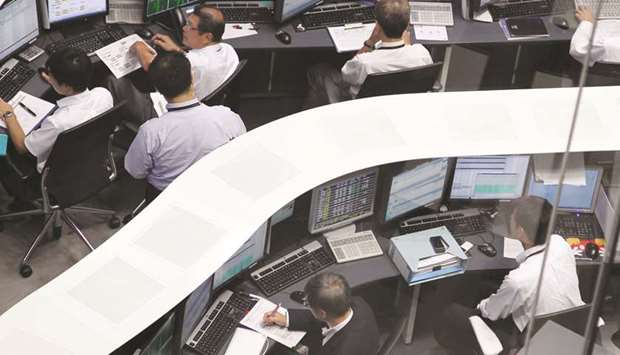Japanese stocks rallied on a weaker yen yesterday as traders bet Prime Minister Shinzo Abe will call a snap election, but other Asian markets struggled on persistent North Korea concerns following a weekend of tense exchanges with Donald Trump.
Abe is expected to announce a vote for next month. Most see him as likely to cruise to victory, with the main opposition in disarray and his popularity boosted by his handling of the Korean crisis.
Adding to the positive tone in Tokyo was a report in the Yomiuri newspaper saying the premier is also considering a multi-billion-dollar stimulus for the stuttering economy.
The prospect of more cash being pumped into financial markets weighed on the yen, providing a boost to exporters in Tokyo trade.
The dollar rose back around the mid-¥112 region, having fallen at the end of last week below ¥112, while the Nikkei ended 0.5% higher.
“The yen is in a favourable range for Japanese stocks,” Toshikazu Horiuchi, a broker at IwaiCosmo Securities, told AFP.” Market players are paying attention to the election, hoping for campaign pledges to boost the economy.”
However, most other regional markets were unable to track Tokyo’s lead following another weekend stand-off between Washington and Pyongyang.
After North Korea’s threat last week to test a hydrogen bomb in the Pacific, Trump and Kim Jong-un’s regime traded fresh barbs.
With the North warning of a missile attack on the US and Trump tweeting its leaders “won’t be around much longer!”, Russian Foreign Minister Sergei Lavrov said “we could drop into a very unpredictable nosedive”.
While most observers say there is little chance of a nuclear war, the ongoing dispute is keeping traders on their toes and Greg McKenna, chief market strategist at AxiTrader, said: “It all sounds like it’s headed toward some sort of conflict.” Hong Kong retreated 1.4% and Seoul was off 0.4% while Shanghai fell 0.3% and Singapore was off 0.2%.
Sydney ended barely higher, having pared morning gains, but Wellington was up 0.7% despite uncertainty following the weekend vote that left New Zealand with a hung parliament.
On currency markets the New Zealand dollar slipped 0.8%, while the euro edged down as German Chancellor Angela Merkel looked set to win a fourth term but with a much reduced share of the vote and a big jump in support for the far-right AfD party.
“The question is obviously now what it means for policy going forward” in Germany, Mitul Kotecha, head of Asia FX and rates strategy at Barclays Bank Plc, told Bloomberg Television.
“Investors are going to be closely following announcements on policy, especially given the fact that the AfD is not just nationalist, but also anti euro to some extent.”
In Tokyo, the Nikkei 225 closed up 0.5% at 20,397.58 points; Hong Kong — Hang Seng fell 1.4% at 27,500.34 points and Shanghai — Composite ended down 0.3% at 3,341.55 points yesterday.

Employees work at the Tokyo Stock Exchange. The Nikkei 225 closed up 0.5% to 20,397.58 points yesterday.
